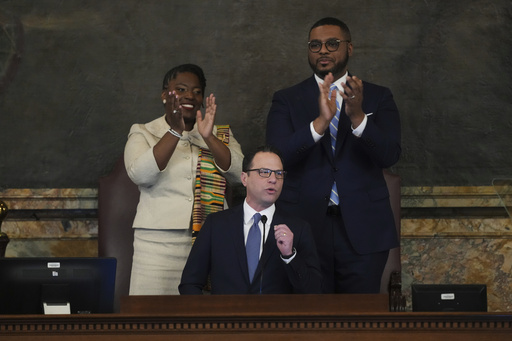
HARRISBURG, Pa. — In a budget proposal revealed on Tuesday, Pennsylvania Governor Josh Shapiro is advocating for increased funding for underfunded public education and public transportation systems. Additionally, he is aiming to garner support for the legalization of marijuana and the taxation of skill games, which are perceived as competition to casinos and lottery games.
Shapiro, a notable figure in the Democratic Party and a potential candidate for the 2028 presidential election, is also proposing additional funding for higher education institutions, suggesting hundreds of millions in tax incentives to promote the development of new power plants. The proposal heavily depends on utilizing billions in surplus revenue to balance the budget.
During a budget address to a combined session of the General Assembly in the House chamber, Shapiro highlighted his administration’s commitment to enhancing Pennsylvania’s economic competitiveness. He encouraged lawmakers to invest wisely using the state’s surplus funds.
“Pennsylvania is ascending and we are not going to halt our momentum,” Shapiro stated in his prepared speech. “We possess the necessary resources to undertake intelligent investments while maintaining a prudent reserve.”
Shapiro’s financial plan has to navigate a divided Legislature; with Democrats overseeing the House and Republicans leading the Senate. His budget proposal exceeds $50 billion for the first time, requesting a total of $51.5 billion for the 2025-2026 fiscal year commencing on July 1, as he prepares for his re-election bid.
However, his capacity to increase spending is significantly limited due to soaring costs associated with medical care for low-income individuals, a sluggish economy, and a declining workforce, which have hampered tax revenue growth.
Shapiro’s fiscal request represents a 9% increase in total authorized spending via the state’s central account, equating to around $3.8 billion. This includes a supplemental request of $230 million for the current year. Out of this request, more than $2 billion is allocated toward human services, including health care for low-income residents, while another $800 million is designated for K-12 and higher education institutions like Penn State, Temple, and the state college systems.
Significantly, $526 million of the new educational funding is part of a wider, multiyear financial strategy in response to a court ruling that condemned Pennsylvania’s public school funding system as unconstitutional for inadequately supporting impoverished districts.
The budget plan aims to balance itself while maintaining tax rates for personal income and sales tax, which are principal revenue sources for the state. Instead, it relies heavily on approximately $4.5 billion in reserve funds to achieve fiscal balance, marking the second consecutive year that the state faces multibillion-dollar deficits.
Projected tax revenues are estimated to rise by $2.3 billion, concluding at $48.3 billion, reflecting a 5% increase, although much is contingent on legislative support for several of Shapiro’s proposals.
One key aspect includes generating nearly $1.2 billion through the legalization of recreational marijuana, along with revisions to the corporate net income tax, and imposing taxes on the growing presence of skill gaming in various venues across the state.
However, advocates representing the education sector have indicated that Shapiro’s proposed funding is insufficient, while operators in elder care and mental health services are also calling for increased financial aid.
Additionally, the budget outlines an increase of nearly $300 million, or 20%, for public transportation agencies, aiming to prevent potential cutbacks at the Southeastern Pennsylvania Transportation Authority, which is experiencing ridership challenges post-pandemic. Shapiro’s budget plan also includes a $175 million increase, or 7%, directed towards eliminating the waitlist for thousands of families needing assistance for intellectually disabled adults.
Moreover, the proposal suggests reducing funding to cyber charter schools to save approximately $400 million excludable from public school payments and recommends closing two state prisons, as the current prison system operates at about 82% capacity. The Pennsylvania State Corrections Officers Association, representing prison staff, promptly expressed their intent to oppose these closures, citing safety concerns for both inmates and personnel.
Thanks to federal COVID-19 relief funds and enhanced tax revenues resulting from inflation over the years, Shapiro is operating with around $10.5 billion in surplus funds, with his proposal set to leave approximately $6.4 billion of that untouched.
This year’s budget already required approximately $3 billion in surplus funds for balance, leading to Republican warnings about the need to curtail spending trends to avoid exhausting the surplus in the coming years.

